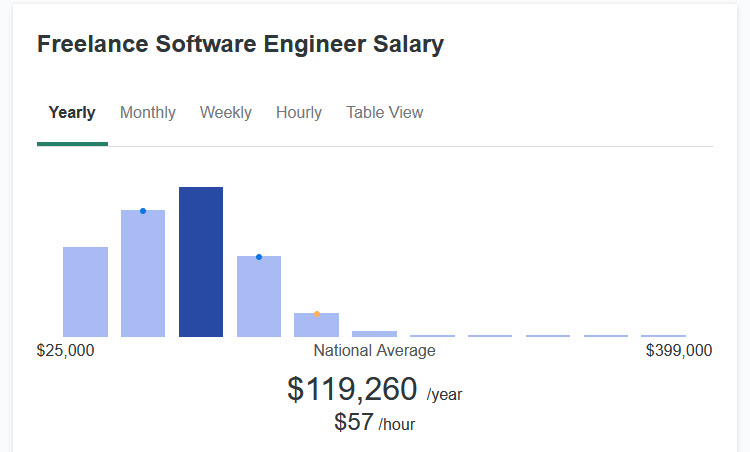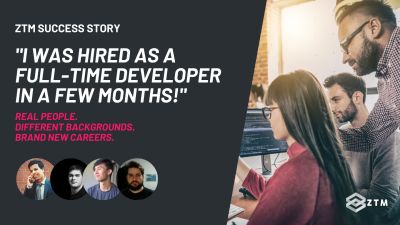
In This Guide:
- What is a freelance consultant?
- What does a freelance consultant do?
- What's the difference between freelance consulting and general freelancing?
- How much do freelance consultants earn?
- Is freelance consulting hard?
- The Top #10 sectors to work in as a freelance consultant
- How to become a freelance consultant (Without a degree!)
- So what's next?
The world of consulting has been behind the doors of big corporate offices for too long.
But big businesses and small startups alike are hopping on the freelance consulting train. In fact, according to a study by the world-famous Boston Consulting Group, around 90% of business leaders believe that using freelance platforms like UpWork and Toptal will be a key source of talent and competitive edge in the near future.
You don’t need a degree or to “know someone” from a company to start working with them anymore.
You just need two things:
- To have knowledge in a particular area
- Know how to market yourself to the right people
In this guide on how to become a freelance consultant, you’ll learn:
- What exactly freelance business consulting is
- How to find your “niche” in the consulting world
- How to actually find and land your first clients
- Why and how to deliver value as a freelance business consultant
- Why and how to become a “thought leader” and authority in your industry
What is a freelance consultant?
Consultants are professional advisors who use their experience and knowledge to help companies solve problems and achieve their goals.
They usually have a specific skill set and experience that the client can bring on to solve a set task, without having to learn it themselves, or hire full-time roles.

What does a freelance consultant do?
Ultimately a consultant is just someone that helps a business (of any size and in any sector) with their problems.
Consultants are hired guns. They're mercenaries brought on board to apply their specific knowledge to a specific problem.
No matter how junior you think you are, you have knowledge that you've gained during your career. (Also, you should always be leveling up your skills). As a consultant you'll use that knowledge to solve problems faced by businesses and package it into professional reports and presentations.
A classic example is usually developing systems at a company that simplify day-to-day operations or take products to market faster.

What's the difference between freelance consulting and general freelancing?
Good question! They're obviously related, but the difference is in the type of work.
Freelancing involves being hired by a business to do a specific task, like building their website, building an app, or running a digital ads campaign. In contrast, freelance consulting is where a business hires you to research & solve a specific problem.
With freelance consulting, the business has identified a specific problem they have and brings you on board to conduct research to identify the root of the problem, prepare and present a report with your findings, and to propose solutions.
This can also lead to more traditional "freelancing" work in the form of implementing those solutions, which can be a nice bonus!
How much do freelance consultants earn?
One of the most significant advantages of becoming a freelance consultant is the potential to earn higher rates for your work.
In traditional employment you're paid a flat salary or based on the number of hours you work, and as an entry level freelancer you're competing on price.
In contrast, as a freelance consultant you're compensated for your knowledge, skills, and expertise. This means that you can charge premium rates for your services, particularly if you're highly specialized or have a unique skill set that's in high demand.
Additionally, as a consultant you have the ability to work more efficiently and effectively than someone who's employed full-time, as you're focused solely on delivering results for your clients. This means that you can likely complete projects in a shorter amount of time, potentially earning more per hour than you would in a salaried position.
While there's no guarantee that you'll earn high rates as a freelance consultant, the potential is certainly there for those who are willing to put in the time and effort to build a successful freelance consulting business.
For example
We ran a survey a few years back of our Zero To Mastery students to find out if they had been hired, promoted or started freelance work after joining our Academy.
Even though this survey didn't collect data about the type of freelance work done by the respondents (e.x. traditional freelancing vs. freelance consulting), the results were astounding:

$40 Million USD from the survey respondents alone!
I won’t spoil all the details as you can go read that article, but one thing did stand out:
We looked at each position and the average salary, and freelance software engineers earned $119,260 per year on average:

Obviously this is just one dataset, so let's look at some others to give you a better idea.
If we look over on ZipRecruiter, the average salaries for freelancers is $119,000.
Obviously this can vary as not all freelancers work the same number of hours or work on the same projects, but you have to admit, that average earnings looks pretty good!
The key of course is to make sure that you’re able to land the top tier freelance jobs adn clients, and we’ll cover that in just a second.
Is freelance consulting hard?
Yes and no.
It's incredibly easy to get set up and start freelancing, thanks to all the online platforms and tools available. Everything from time tracking tools to boost productivity, invoice software to manage payments, and project management apps to help you stay organized.
However, it does take work to become an authority and start charging higher rates. Nothing too complex, just an ability to show a depth of expertise.
Likewise, finding and bringing in clients, running your own taxes etc. It's all additional tasks you might not do in a normal job. This can be a lot of extra effort at first, but you can always outsource this.
Also, once you have this handled, freelancing can be incredibly lucrative and easy to do.
For example
If you specialize in a specific task, you can work just a few hours a day, systematize your process and earn 3-10x more than you would in a normal job. (Some consultants charge thousands of dollars an hour for advice only - without even doing the task!)
The issue is just doing all the right steps to get to that level of automation and earnings, so let's get into those now...
The Top #10 sectors to work in as a freelance consultant
The top ten sectors in business consulting for freelancers are:
- Strategy and Internal Relations
- Marketing
- Operations
- Human Resources
- Business and Corporate Development
- Procurement
- CEOs and Presidents (interim leadership roles)
- Digital and Tech
- Interim Leadership Roles such as General Managers and P&L (Profit and Loss) Leaders
- Innovation and R&D (Research and Development)
I know what you’re thinking right now, but don’t be intimidated by this list!
While you may not be in a position to take on a leadership role, there are a lot of areas that you can easily get into.
And often you can take your current skills, like Python or Web Development, and simply apply it to one of these sectors.
For example...
As a skilled software engineer, you can often get hired to build systems in each of those sectors without any prior experience directly with that sector.
The client simply explains the problem. Then you identify the cause and propose the solution using your technical knowledge.

How to become a freelance consultant (Without a degree!)
So now that you see the potential you have in freelance consulting, both to apply your skill set in new ways and to make a flexible, exciting, and high-paying work-at-home career out of it, it's time to get serious.
Let's break down how to make this happen...
Step #1. Choose a profitable niche and craft a valuable offering around it
This is an important one, so I’m going to break it down into two pieces.
Choose a freelance consulting niche
The first thing to think about when choosing your niche is experience: what kind of knowledge and experience do you have that you can draw upon?
If you really think about it, chances are you’re already in a position where you have useful knowledge and experiences that you can draw upon.
This might come from your existing job, but it doesn’t have to. You may have developed an extensive knowledge or skill set through your passion projects or extracurriculars.
For example, you could have in-depth technical SEO knowledge after building a website for a portfolio project, or you may have creative project management experience from volunteering for a nonprofit.
Sometimes just simply being an outsider and seeing a problem for the first time can give you insights that those who have struggled with the problem for a while might miss.

The second thing to think about when choosing your consulting niche is profitability: of the niches that I have experience in, which have the most high-paying jobs?
Do your research to figure out what kind of consulting services people are looking for right now.
The most basic but efficient way to do this is to search for freelance consulting jobs on freelancing websites like Upwork, Fiverr, and Freelancer.com, and then on job database sites like Indeed.
For more information, I have a lesson on how to choose a profitable freelance consulting niche in my Complete Guide to Freelance Consulting course, which I've made free for you here.
Craft a valuable offering
The best way to make the skills you’re offering more appealing to a broader range of clients is to utilize the value ladder.
A value ladder is pretty straightforward: you offer a few different pricing tiers, and let clients choose which tier they can afford.
Your initial offering might be free or low-cost, such as an initial meeting to talk about their problem or project. Then, you would offer a “basic package” with different valuable “add-on” services to fit different clients’ needs and budget, and then finally a premium ‘done for you’ service.
This allows you to appeal to a wider audience and you can get paid for less labor intensive tasks.
But also (spoiler alert!) you'll find that a segment of your customers who buy your lower tier offers will then upgrade to a higher tier soon after.
You can learn more about the Value Ladder in this lesson here.
Step #2. Find and land your first freelance consulting jobs
Now it’s time for the rubber to meet the road.
You’ve decided on your niche and you've set up your value ladder, and so now it’s time to start applying for your first consulting job.

Freelancing websites like Upwork, Fiverr, and Freelancer.com are all good places to start, since there are so many potential clients just waiting to hire out consultants.
Don’t forget your own network though!
Ask around to see if any startups, small businesses, or established businesses are looking for consultants in your area or online.
You never know who is on your LinkedIn and what connections they have. Oh and did you know that Linkedin messages have a 5-20% open rate on average? That's much higher than if you were trying to cold email companies out of the blue.
Add in the fact that they can then check out your skills on your profile and its an easy way to get clients. (Some companies will even pitch these for you if you want to scale this out later on)
You can click here to for lesson with more details on how to land your first consulting job.
A technique I used that worked great when starting out was to simply offer to work for free, under the provision I could share all the details in a case study. This then got my foot in the door and helped secure a lot of clients.
You can simply pitch your ideal clients, businesses your already know, or even volunteer for a non-profit with your services. That way you're also helping out a good cause!
Often this lead to higher paying gigs then I would have got if i just tried to pitch them on their own, and even repeat work with the company I volunteered with. It makes sense right? They've seen the results and work you can do, so it's a no brainer!
Step #3. Prove your value
A lot of companies — and, to be honest, a lot of freelancers — have trouble identifying the concrete outcome that should result from a consulting project, let alone how to measure that outcome.
They just sort of say “solve this problem for me, please!”
For example
In this consulting job on UpWork, the client is looking for a web developer to “analyze our website speed…and suggest, consult, and/or implement ways we can improve our overall speed, performance, and page load time”.

The job posting gives you a general idea of what they want, but it’s light on concrete goals and the actual work product that they want to receive both throughout and at the end of the job.
If your client doesn’t give you very specific goals and key performance indicators (KPIs), it’s important that you present some concrete evidence of the value you’re bringing to them.
Remember, sometimes you need to advocate for yourself, because no one else is going to do it for you.

Advocating for yourself is not the same as bragging. Rather it's proving the value you provide so that your clients can understand how you’re helping them.
This is where metrics come in.
You have to figure out how to quantify your offerings and show them to clients.
This may come in the form of presenting research, identifying and collecting key performance metrics, doing A/B tests, and more. It depends on your niche and the needs of your client.
This can then also help you know how much you can afford to charge!
Worried about how much to charge?
I just recorded an hour long AMA about the most common freelance questions, including how to deal with charging people, and much more. Check it out below:
Be sure to check it out!
For example
In the digital marketing world common key performance metrics that are presented to clients include the following metrics: clickthrough rates, sales numbers, return on ad spend, number of subscribers, survey answers, process speed, and costs.
If your customer knows their own metrics then they might have found out that an email subscriber is worth around $20 to them.
If your skillset is in doubling their email optins each month, suddenly the work you're doing is worth potentially tens of even hundreds of thousands of dollars to that company, so it's a no-brainer for them to hire you and pay them big bucks.
You just need to show the value and show you can do what you promise, so always make sure to keep track of your metrics for any previous client work.
This not only will prove your value to current clients, but if you're allowed to share, you can also prove your value to new clients, making it even easier to land more and higher-paying jobs in the future.
See how this turns into a positive feedback loop?

Step #4. Become an authority and thought leader in your industry
You can get freelance work fairly easily, but if you really want to stand out and get paid more than the average freelancer then you want to build authority.
You see, people want to hire someone who has an online presence and has authority in their space.
Someone who knows about the latest industry trends in their niche, and offers their advice to others.
For example, Neil Patel is an authority in the SEO and digital marketing industry. He is obviously way more likely to land high-paying business consulting projects than someone who has no online presence at all.
But you don’t need a million followers to gain credibility with clients. Simply having 100 followers is a great start.
The fact that you’re consistently putting your thoughts out into the world via YouTube or Twitter (or whatever) is often enough to prove your credibility, regardless of how many followers you have.
Now I know this guide is meant to help you become a freelance consultant today, and you can't build authority and become a thought leader in just a day.
But you can start today.
Just create a blog or social media account and put out one thought today. Like right now. Don't worry about making it a genius insight. It can be the most obvious piece of information ever. That's completely fine. You just need to start somewhere. And today is where you start.

Building authority works so make sure to develop your own personal brand.
- Do some research about what’s going on in your industry
- Write up some content about it (like Andrei does with Web Developer Monthly and Daniel with Machine Learning Monthly
- Start small and grow as you find your voice
- Share it with others through a professional website, social media, and on your freelancing profiles
- Connect with others in your industry and build up a reputation with them as well. With a community of freelancers in your industry, you’ll have the chance for collaboration, giving advice, and referring each other to clients
When it's laid out like this it's actually pretty straightforward, right?
All it takes is following the steps and doing the work.
As an aside, and as a freelance consultant myself, I highly recommend the lifestyle. By working on a freelance basis I have the flexibility to work from anywhere in the world and on my own schedule. It's amazing.
So what's next?
It really is that simple to become a freelance consultant.
Find a niche that compliments your skillset, get paid, deliver value, and build authority so that you can get the best clients and projects.
If you want to dive deeper and take your freelance consulting career to the next level, I’ve just released my Freelance Consulting Bootcamp that will help you do just that.
Average time to complete: 18 days
In this course you’ll learn:
- How to solve problems for businesses seeking consultants on freelancing websites
- Case studies that bring you behind-the-scenes with actual clients
- Build relationships with clients so that you can earn recurring income
- Step-by-step breakdown of landing your first client to growing your freelance consulting business
- Use professional tools for client and project management
- Tools to prepare professional reports and presentations
- Use your existing knowledge & expertise in any sector to consult and provide value to companies
- Craft consulting proposals that will land you desirable clients
- Build a side-hustle or a full-time online income with a flexible schedule
- Technical skills from data visualization to A/B testing
- and much more
And here at Zero To Mastery we have a thriving online community of thousands of lifelong learners including tons of other freelancers (including me!) that are happy to help you with advice and answer questions.
I look forward to seeing you there!






